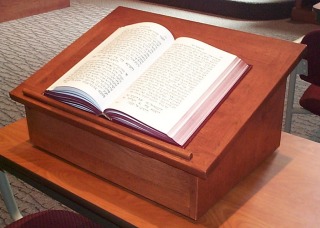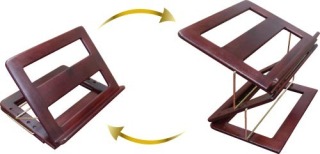A shtender is a small (usually wooden) frame that holds a book, usually your original source upright (Talmud or a commentary, for example). These frames come in essentially two versions: tabletop and a standing version. The goal is to reduce the strain on your eyes and back. Even better, some feature a footrest! A shtender definitely helps, though it can be difficult to make written notes in the book on it.
A shtender can also hold your siddur while you pray. In my experience, it’s difficult to keep a siddur on the shtender if you don’t have the prayers memorized. Or maybe my eyesight is just that terrible!
Usually holding only one book each, they’re essentially Jewish lecterns. The word shtender is Yiddish, meaning “stander.” To my knowledge, this is the only word used for them today, though there must be a Hebrew term somewhere. They’re heavily associated with yeshivot in Eastern Europe, so I’m also unclear when they entered the Jewish world and whether they existed in the classical Sephardi world.
Here are some examples of the standing shtender, which you’re probably most familiar with because the shaliach tzibor or the chazzan will often lead davening from one at the front of the shul, sometimes at the bimah and sometimes not. (You can read more about the bimah and the gabbai here.)
You might also find them on the backs of seats in your shul:
The tabletop ones are the kind you most often find in homes or in the beit midrash:
Some even have a locking box so that you can put your books away safely until your next study session. Some uses for locking shtenders include:
- Keep your children from losing your place or your book/sefer
- Store prayer books (siddurim) and other religious texts at your seat in the shul if your community doesn’t have an eruv or you don’t hold by it
- Hold your books in the beit midrash so they aren’t mistakenly put away – be careful, don’t prevent someone else from using a community book!
In my opinion, shtenders are a bit expensive, but they are worth it for the ease, convenience, and saved space. Unfortunately, I’m high-maintenance and want this one that is for the tabletop but adjusts for standing use. My precious…











They are totally the best thing ever, though they don't have to be pricey. I found the tabletop one I got as a present many years ago for $12 on eBay.
If you want a shtender and can't afford one, you can make one out of cardboard, too: http://www.chinuch.org/item_detail/Easy-to-Make-Shtender